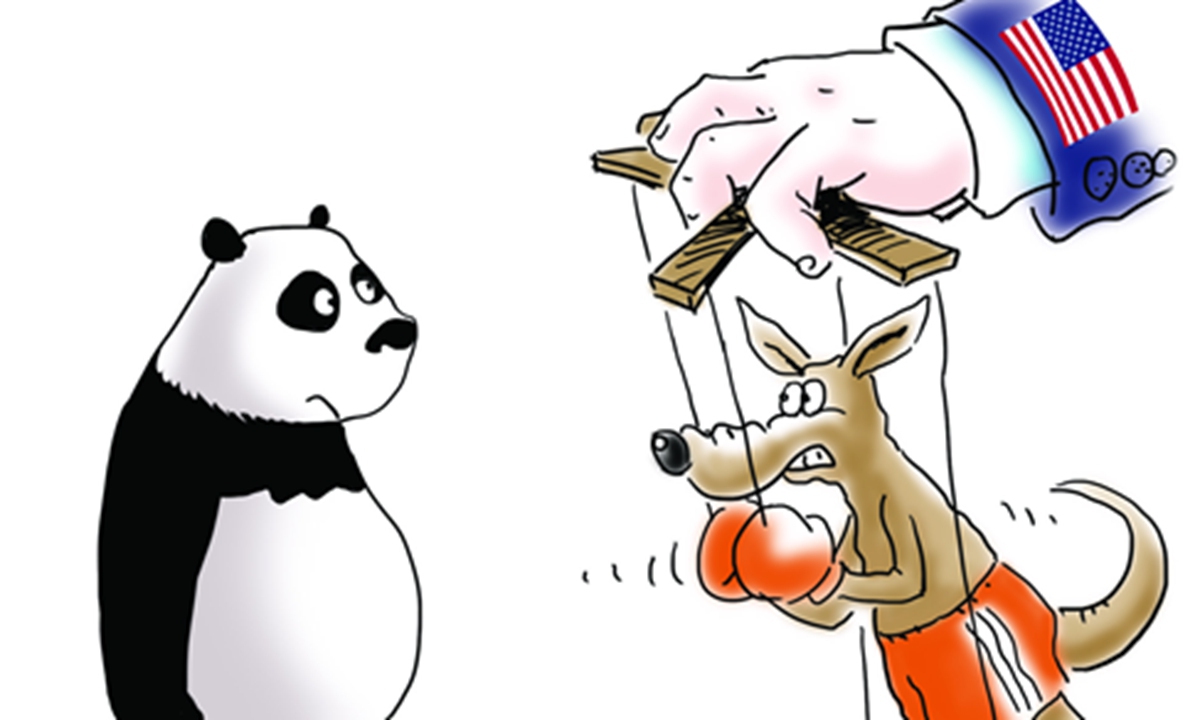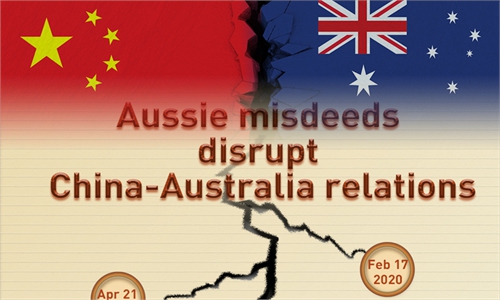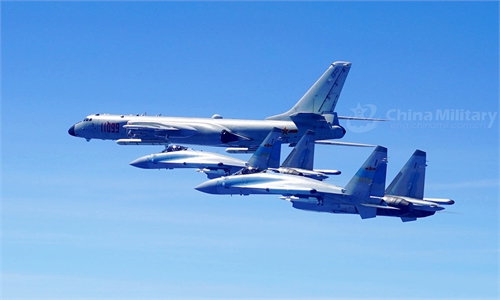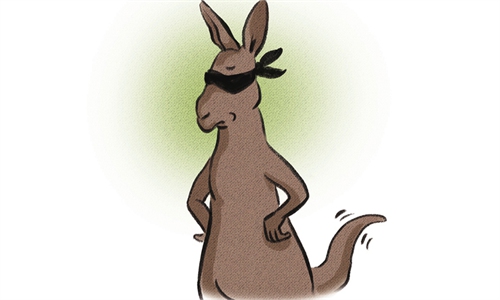
Illustration: Xia Qing/GT
Editor's Note:GT: How is the Morrison government's hype of war dangerous and damaging? Do you think the hawkish officials from the Morrison government are clearly aware of the consequences of a military clash with China to Australia? Or is talking about war just an easy gesture to make for political expediency?
Laurenceson: Former prime minister Rudd's criticism of war talk was mostly because he regarded it as being deployed by members of the current Morrison government for domestic political gain. But in the process, the chest-thumping rhetoric further damages Australia's already dysfunctional relationship with China, nor did it inform the Australian public just how catastrophic the costs of such a war would be.
This political tactic of hyping an external "threat" to induce a "rallying around the flag" effect occurs in other countries too, including China and the US. That said, the risk of a kinetic conflict over Taiwan has increased compared with, say, five years ago. This means it is appropriate for sober-minded analysis and planning within the Australian government's Department of Defence, and in communicating to the public just what is at stake in terms of Australia's national interests and values. But the priority must be avoiding a military conflict, not hyping the risk for domestic political gain, or regarding it as inevitable and now starting to treat China as a de-facto enemy. China is far more a friend to Australia than an enemy.
GT: Most analysts would not deny that Washington can no longer expect a quick and easy victory in a war with China in the Western Pacific. Why has Australia under Morrison been boasting following the US and taking the risk?
Laurenceson: Within the Australian government, there is a significant gap between the key decision-makers and those more on the fringe. The reported hawkish comments by Minister for Defence, Peter Dutton, for example, were more qualified when you read the full transcript of what he said rather than just the version presented in the headlines.
My own view is that the Australian Prime Minister should not seek to silence those more on the fringes. We should have the confidence as a country that having a vibrant and sometimes messy public debate eventually sees the best ideas, arguments and analysis rise to the top. But there's still a compelling case for political leadership to be exercised during this process. For example, the Prime Minister should make it clear that fringe positions do not align with the considered and informed views of government ministers or the National Security Committee of cabinet. Further, the Prime Minister ought to plainly call out hysterical talk that hypes the threat that China poses to Australia. I find it interesting that Joe Hockey, the former Australian ambassador to the US, said last year that while we regularly disagree with the US, we do so "quietly" and in a way designed to not "humiliate the United States or humiliate the President". And this sensitivity is despite Australia and the US touting "100 years of mateship" and an "Unbreakable Alliance". Yet, in the case of China, Canberra regularly reaches for the megaphone.
GT: Some scholars argued that the Morrison government's attempt of containment against China is one of the biggest failures of statecraft in Australia's history. To what extent do you agree?
Laurenceson: I'm not yet willing to conclude that the Morrison government is trying to "contain China" - if what is meant by that is keeping China down so that it will forever be second place to the United States in terms of wealth and power. Certainly, there are voices in Australia, including within the government, who do favour that approach. But again, I don't think that's the view of the key decision-makers.
What I would say is that the government and much of the Australian public is anxious about what a region dominated by China would mean for the national interest. And this has been compounded by the trade disruption that Beijing has authorised over the past year. Whatever the domestic political logic within China of these trade disruptions - and I do understand the legitimate sense of grievance that China feels over a number of Australian government decisions - this economic punishment has backfired badly in terms of wider perceptions about China in Australia. Quite frankly, it has been a gift for those in Australia keen to advance a China Threat narrative.
For example, Australian farmers were previously amongst the biggest supporters of strong China ties. But now they are suffering harshly because of political disagreements they have nothing to do with. These hard-working, down-to-earth Australians are the furthest from Canberra and the defence and security establishment you could possibly imagine. Beijing regularly blames the Australian government and media for poisoning the discussion of China and I accept that there are plenty of examples where this is true. But a good chunk of the grist for the China Threat narrative in Australia also comes from actions that Beijing has itself decided to pursue.
I hope that informed diplomats in the Chinese foreign ministry have noted that despite trade ties being disrupted, not only has Canberra not changed its political decisions, but Australian public support and that of groups like the business community have also fallen away. Similarly, I hope that informed diplomats in Canberra realise that the current Australian government approach of being "tough on China" is more sloganeering than serious strategy, and doubling down on this doesn't serve the national interest.

Illustration: Liu Rui/GT
GT: In international politics, striking a delicate balance between big powers is believed to be the optimal approach for smaller nations to emulate. This is how countries like Singapore and even New Zealand tread carefully between China and the US-led Western camp to maximize their interests. But Australia clearly stands by the US and takes the lead to confront China at the cost of its own interests. Is it a miscalculation?Laurenceson: I'd begin by making the points that Australia has significantly more economic and strategic weight than Singapore and New Zealand, and it is not only Australia that is finding it difficult to maintain constructive relations with China. China's foreign policy has become significantly more assertive - some would say aggressive - over the past decade. Most recently we've seen that an investment agreement between China and the EU that was celebrated just a few months ago by both sides now risks being suspended. China can, of course, pursue any foreign policy it wishes, and I also understand that historical factors mean Beijing and the Chinese public are, quite understandably, not willing to be pushed around and treated as second-class global citizens as Western countries treated them in the past. Still, other countries will naturally respond when they see their interests being threatened. Great powers like China and the US, for all their greatness, must still deal with the fact that smaller, less powerful countries possess considerably agency.
But yes, I do think that since 2017 the Australian government has been let down by inept diplomacy and an excessively uncritical position towards the US alliance. To be clear, I'm not suggesting - and hardly anyone in Australia is - that Australia should walk away from the US alliance. Australia is in an alliance with the US because it's in Australia's interests to do so. But the US alliance has become the de-facto centrepiece of Australia's foreign policy. What Beijing regularly gets wrong is that Australia just follows US orders. In fact, the causality is often the opposite. Australia lives with an acute 'fear of abandonment" and so strives for opportunities to signal its worth to a "great and powerful" friend. It is, in my view, an embarrassing trait that lies deep in the national psychology.
This treatment of the US alliance as a civic religion is all the more ridiculous given just how much the world has changed with China's rise. Other countries seem to grasp better than Australia that while they need to protect their interests, they also need to have a constructive working relationship with China because this brings significant benefits. These days in Australia there is an excessively one-eyed preoccupation with the risks associated with engagement with China, and a failure or unwillingness to accept the basic point that Australia cannot achieve its foreign policy objectives given the current state of relations with China. The hope in Canberra these days is that relations will, if we stand up to China enough, reach a new "settling point" where a "happy coexistence" can begin. But what is not explained by Canberra is why we should expect a settling point rather than a continuation of the downward spiral we are now on, or at what level this "settling point" will be achieved. An extended period of dysfunctional relations with China with growing economic costs can hardly be considered an acceptable "settling point" for Australia's national interest, particularly if other countries are able to maintain constructive relations with China, albeit not without having to work hard to manage their own challenges.
Particularly disappointing at the moment is that both sides blame the other entirely for the current tensions. Canberra is demonstrating no capacity for critical reflection and an ability to adjust course. This is true for Beijing too, and Chinese government ministers are not even willing to pick up the phone when their Australian counterparts call. The disappointing attitude seems to be that dialogue would be a concession to Australia.
GT: Although Australia and the US are allies, how much confidence do Australia's political and strategic circles have toward the actual support and protection Washington will (or can) offer to Australia?
Laurenceson: I think there is a high degree of confidence within political and strategic circles that the US would support Australia in a military conflict. Of course, there are a lot of scenarios between where things are now and one where Australia is being attacked in a military conflict. And along that spectrum, my view is that Australia should be realistic and not be "doe-eyed" about what it can expect from America. For example, the US has said that it stands "shoulder-to-shoulder" with Australia on the trade disruption that China is directing at Australia. And that's true in terms of rhetoric and expressions of sympathies. This is to be appreciated. But meanwhile, companies from other countries, including the US, are snapping up the markets in China that Australian ones previously supplied. Many strategic concepts like military alliances and intelligence-sharing arrangements struggle in the economic realm and I don't think high hopes should be placed in these. Rather than trying to forge an "economic alliance" against China amongst, for example, the Five Eyes countries, it would be far more effective for Australia to put fresh and rigorous thinking into how we ourselves can improve economic resilience rather than relying on others. Doing so would also help Australia to break out of a mentality of being dependent on "great and powerful friend".



